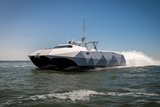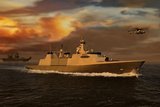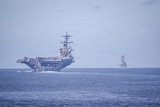SeeByte awarded Maritime Autonomous Systems interoperability demonstration contract
Interoperability in Maritime Autonomous Systems. (Photo: Dstl/ Crown Copyright)
Dstl has awarded SeeByte a contract under its R-Cloud framework to continue work with the SCI-343 Research Task Group (RTG) “Enabling Federated, Collaborative Autonomy”.
The research aims to mature and test a communications protocol enabling the autonomous collaboration of robotic vehicles across domains in communication-linked environments.
The goal is to allow systems operating with any autonomy software to integrate with the protocol and interoperate with other systems using the protocol.
SeeByte engineering manager Andrea Munafo said: Interoperability between autonomous systems, and in particular in comms limited environments, is a great challenge in the underwater domain.
‘It is a great opportunity for us to provide a solution and to demonstrate this capability at sea.’
Neptune allows multiple tasks to be run in parallel, with vehicles automatically taking up responsibility for them. Vehicles can swap tasks, add new ones or manage problems optimising mission execution.
SeeByte plans to demonstrate its collaborative autonomy capability using SCI-343 at sea during REPMUS 2022.
More from Naval Warfare
-
![Spain’s F100 upgrade mirrors Aegis modernisation paths in allied navies]()
Spain’s F100 upgrade mirrors Aegis modernisation paths in allied navies
The Spanish Navy’s Alvaro de Bazan-class of air defence frigates will receive the latest Aegis Weapon System technology among other modernisations to extend the service life to 2045.
-
![UK’s Fleet Solid Support ship programme deemed on track despite steel supply concerns]()
UK’s Fleet Solid Support ship programme deemed on track despite steel supply concerns
Shipbuilders are saying the programme is going ahead on time as the government estimates 7.7 million tonnes of steel are needed for 2026 infrastructure projects.
-
![Raytheon unveils details of its proposal for the US Navy/NATO ESSM Next Significant Variant]()
Raytheon unveils details of its proposal for the US Navy/NATO ESSM Next Significant Variant
In an exclusive interview with Shephard, Raytheon’s VP of Shipboard Missiles disclosed what improvements the company plans to offer for the Sea Sparrow NSV.
-
![US Coast Guard Cutter Polar Star’s 50-year service highlights capability gaps in Antarctica]()
US Coast Guard Cutter Polar Star’s 50-year service highlights capability gaps in Antarctica
Delays in the construction of the Polar Security Cutter – the future substitute for the Polar Star – are likely to prolong the ageing icebreaker’s service time even more, putting the USCG in a risky position.
-
![As Indonesia doubles up its order, who else is looking at the Arrowhead 140 frigate design?]()
As Indonesia doubles up its order, who else is looking at the Arrowhead 140 frigate design?
The adaptable design of Babcock’s Arrowhead 140 frigate, already selected by the UK Royal Navy and Poland, has led to more orders from Indonesia while other countries continue to weigh it up.
-
![Does the increase in US firepower in the Middle East indicate another Iran strike?]()
Does the increase in US firepower in the Middle East indicate another Iran strike?
The presence of the USS Abraham Lincoln Carrier Strike Group in the Persian Gulf means additional naval and aerial capabilities, which provides the US with multiple attacking options.























